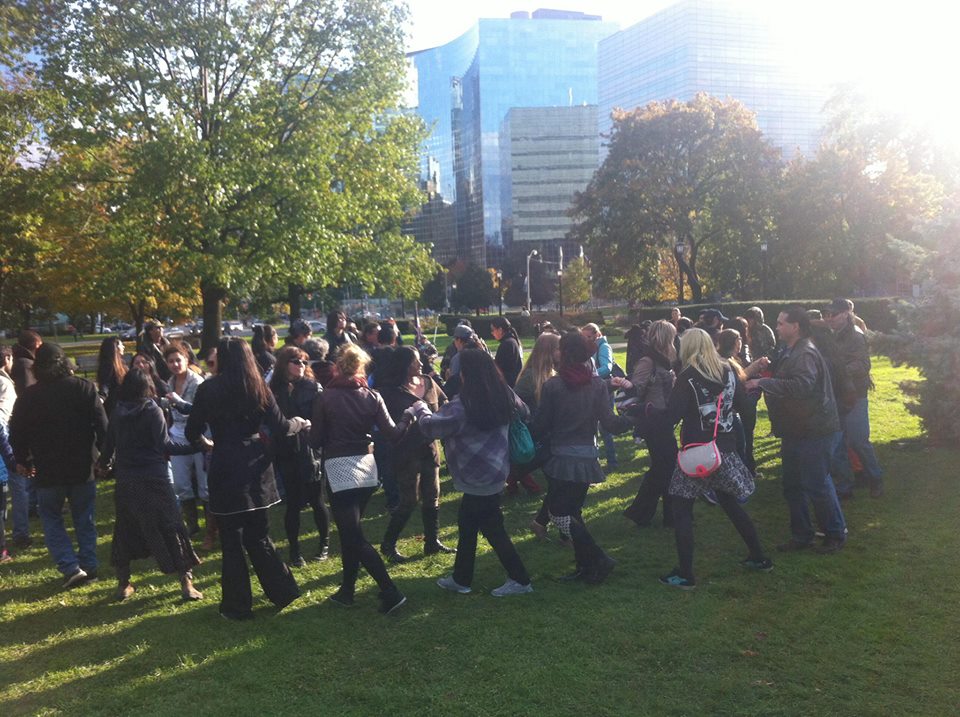Only a week ago, the Mi’kmaq and Elsipogtog First Nations were under siege by the Royal Canadian Mounted Police (RCMP) as the force acted upon an injunction to shut down an anti-fracking blockade.
Early that Thursday morning, hundreds of RCMP officers — some dressed in camouflage and assuming sniper positions in the woods surrounding the protest camp — moved in to clear out the highway and surrouding area near the town to Rexton, New Brunswick.
The Mi’kmaq Warriors Society’s encampment and highway blockades were in response to SWN Resources which was seeking to scan the traditional territories of the Indigenous in the region with seismic trucks to determine the potential for fracking shale gas from the ground.
Discontent with SWN Resource’s gas exploration has been going on in the area since June of this year, when community members began to take action against the potentiality for the fracking of shale gas.
Fracking is essentially a natural resource extraction technique that fractures an area of rock with a pressurized liquid. In this case, the fracking would release natural gas — SWN is currently in the process of using large trucks with seismic equipment to locate natural gas deposits.
“Fracking, or hydraulic fracturing, is the process of extracting natural gas from shale rock layers deep within the earth. Fracking makes it possible to produce natural gas extraction in shale plays that were once unreachable with conventional technologies. Recent advancements in drilling technology have led to new man-made hydraulic fractures in shale plays that were once not available for exploration.”
On Monday October 21, 2013, New Brunswick premier, David Alward, publically stated that he hopes SWN Resources will be able to resume its operations in peace.
Monday was also the day activists learned that the injunction against them had been removed by the courts.
SWN Resources had gone to the courts and first issued the activists an injunction on Wednesday October 2, 2013, regarding the blockades and the seizure of SWN equipment. The RCMP had thus moved in and raided the area, removing the blockade and clearing out the Mi’kmaq Warrior Society’s camp.
But now, since there is no longer the warrior camp nor the blockade and since SWN has retrieved the equipment, there is no longer any part of the injunction to enforce.
In enforcing the injunction with the RCMP, over 40 people were arrested with some still behind bars. Six police vehicles were set on fire. Police were pelted with stones as scuffles broke out between the two opposing forces. A few Molotov cocktails were thrown at police lines in the early morning. Activists on the front lines faced pepper spray, rubber bullets and police dogs during the standoff. Once the SWN vehicles were removed and the blockade cleared, the RCMP left the scene.
Opponents of fracking contend that it takes an estimated 1-8 million gallons of water to complete each fracturing job and 40,000 gallons of chemicals. That is a lot of pollution.
So essentially, if you drink water, then fracking is an issue you should be concerned with.
Digging deeper into the relationship between First Nations communities and the government — which should be a nation-to-nation relationship — Indigenous rights activists contend that the territory in question was never ceded to Canada.
It also should be noted that, “ever since 2010, when New Brunswick handed out 1.4 million hectares of land — one-seventh of the province — to shale gas exploration, opposition had been mounting.”
Now that the police raid is over and the injunction lifted against his people, Elsipogtog Chief Arren Sock said his community is ready to forgive the RCMP after what he calls “horrendous” treatment.
“One of the things that our community does well is heal,” said Chief Sock at a Monday morning press conference. ”The Mi’kmaq are always a forgiving people, and that goes for Elsipogtog as well.”
More on the good news front, Mi’kmaq warrior, Tyson Peters, will most likely not face the amputation of his leg due to an injury sustained after being shot by the RCMP with less-than-lethal rounds.
I don’t know how much the RCMP action against the Mi’kmaq and Elsipogtog Nations has cost and it is estimated that hundreds of police were deployed for last Thursday morning’s raid.
I do know that when Harper gave his latest throne speech, he promised a “renewed effort” to ending the frightening tragedy of violence and murder against Indigenous women in Canada.
What if all the money, officers and resources were redirected from police actions against First Nations communities towards bringing justice to missing and murdered Indigenous women?
*
Please keep following rabble’s coverage of Idle No More and other actions for more news as it rolls in.



